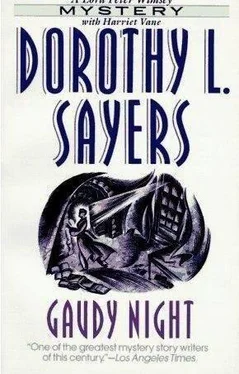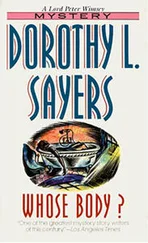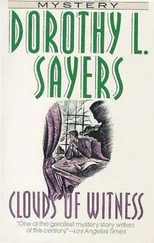Dorothy Sayers - Gaudy Night
Здесь есть возможность читать онлайн «Dorothy Sayers - Gaudy Night» весь текст электронной книги совершенно бесплатно (целиком полную версию без сокращений). В некоторых случаях можно слушать аудио, скачать через торрент в формате fb2 и присутствует краткое содержание. Жанр: Детектив, на английском языке. Описание произведения, (предисловие) а так же отзывы посетителей доступны на портале библиотеки ЛибКат.
- Название:Gaudy Night
- Автор:
- Жанр:
- Год:неизвестен
- ISBN:нет данных
- Рейтинг книги:4 / 5. Голосов: 2
-
Избранное:Добавить в избранное
- Отзывы:
-
Ваша оценка:
- 80
- 1
- 2
- 3
- 4
- 5
Gaudy Night: краткое содержание, описание и аннотация
Предлагаем к чтению аннотацию, описание, краткое содержание или предисловие (зависит от того, что написал сам автор книги «Gaudy Night»). Если вы не нашли необходимую информацию о книге — напишите в комментариях, мы постараемся отыскать её.
Gaudy Night — читать онлайн бесплатно полную книгу (весь текст) целиком
Ниже представлен текст книги, разбитый по страницам. Система сохранения места последней прочитанной страницы, позволяет с удобством читать онлайн бесплатно книгу «Gaudy Night», без необходимости каждый раз заново искать на чём Вы остановились. Поставьте закладку, и сможете в любой момент перейти на страницу, на которой закончили чтение.
Интервал:
Закладка:
“I wonder,” said Harriet, “if I could be of any help to you in getting the proofs put together. I’d gladly stay up for a week or so if it would do any good. I’m quite used to juggling with proof-sheets, and I think I can remember enough of my Schools work to be reasonably intelligent about the Anglo-Saxon and Early English.”
“That would be a tremendous help!” exclaimed Miss Lydgate, her face lighting up. “But wouldn’t it be trespassing far too much on your time?”
Harriet said, No; she was well ahead with her own work and would enjoy putting in a little time on English Prosody. It was in her mind that, if she really meant to pursue inquiries at Shrewsbury, Miss Lydgate’s proofs would offer a convenient excuse for her presence in College.
The suggestion was left there for the moment. As regards the author of the outrages. Miss Lydgate could make no suggestion; except that, whoever it was, the poor creature must be mentally afflicted.
As she left Miss Lydgate’s room, Harriet encountered Miss Hillyard, who was descending the staircase from her own abode.
“Well,” said Miss Hillyard, “how is the investigation progressing? But I ought not to ask that. You have contrived to cast the Apple of Discord among us with a vengeance. However, as you are so well accustomed to the receipt of anonymous communications, you are no doubt the fittest person to handle the situation.”
“In my case,” said Harriet, “I only got what was to some extent deserved. But this is a very different matter. It’s not the same problem at all. Miss Lydgate’s book could offend nobody.”
“Except some of the men whose theories she has attacked,” replied Miss Hillyard. “However, circumstances seem to exclude the male sex from the scope of the inquiry. Otherwise, this mass-attack on a woman’s college would suggest to me the usual masculine spite against educated women. But you, of course, would consider that ridiculous.”
“Not in the least. Plenty of men are very spiteful. But surely there are no men running about the college at night.”
“I wouldn’t be too sure of that,” said Miss Hillyard, smiling sarcastically. “It is quite ridiculous for the Bursar to talk about locked gates. What is to prevent a man from concealing himself about the grounds before the gates are locked and escaping again when they are opened in the morning? Or climbing the walls, if it comes to that?”
Harriet thought the theory far-fetched; but it interested her, as evidence of the speaker’s prejudice, which amounted almost to obsession.
“The thing that in my opinion points to a man,” went on Miss Hillyard, “is the destruction of Miss Barton’s book, which is strongly pro-feminist. I don’t suppose you have read it; probably it would not interest you. But why else should that book be picked out?”
Harriet parted from Miss Hillyard at the corner of the quad and went over to Tudor Building. She had not very much doubt who it was that was likely to offer opposition to her inquiries. If one was looking for a twisted mind, Miss Hillyard’s was certainly a little warped. And, when one came to think of it, there was no evidence whatever that Miss Lydgate’s proofs had ever been taken to the Library or ever left Miss Hillyard’s hands at all. Also, she had undoubtedly been seen on the threshold of the S.C.R. before Chapel on the Monday morning. If Miss Hillyard was sufficiently demented to inflict a blow of this kind on Miss Lydgate, then she was fit for a lunatic asylum. But indeed, this would apply to whoever it was.
She went into Tudor and tapped on Miss Barton’s door, asking, when she was admitted, whether she might borrow a copy of Woman’s Place in the Modern State.
“The sleuth at work?” said Miss Barton. “Well, Miss Vane, here it is. By the way, I should like to apologize to you for some of the things I said when you were here last. I shall be very glad to see you handle this most unpleasant business, which can scarcely be an agreeable thing for you. I admire exceedingly anyone who can subordinate her own feelings to the common advantage. The case is obviously pathological-as all anti-social behaviour is, in my opinion. But here there is no question of legal proceedings, I imagine. At least, I hope not. I feel extremely anxious that it should not be brought into court; and on that account I am against hiring detectives of any kind. If you are able to get to the bottom of it, I am ready to give you any help I can.”
Harriet thanked the Fellow for her good opinion and for the book.
“You are probably the best psychologist here,” said Harriet. “What do you think of it?”
“Probably the usual thing: a morbid desire to attract attention and create a public uproar. The adolescent and the middle-aged are the most likely suspects. I should very much doubt whether there is much more to it than that. Beyond, I mean, that the incidental obscenities point to some kind of sexual disturbance. But that is a commonplace in cases of this kind. But whether you ought to look for a man-hater or a man-trap,” added Miss Barton, with the first glimmer of humour Harriet had ever seen in her, “I can’t tell you.”
Having put away her various acquisitions in her own room, Harriet thought it was time to go and see the Dean. She found Miss Burrows with her, very tired and dusty after coping with the Library, and being refreshed with a glass of hot milk, to which Miss Martin insisted on adding just a dash of whisky to induce slumber.
“What new light one gets on the habits of the S.C.R. when one’s an old student,” said Harriet, “I always imagined that there was only one bottle or ardent spirits in the college, kept under lock and key by the Bursar for life-and-death emergencies.”
“It used to be so,” said the Dean, “but I’m getting frivolous in my old age. Even Miss Lydgate cherishes a small stock of cherry brandy, for high-days and holidays. The Bursar is even thinking of laying down a little port for the College.”
“Great Scott!” said Harriet.
“The students are not supposed to imbibe alcohol,” said the Dean, “but I shouldn’t like to go bail for the contents of all the cupboards in College.”
“After all,” said Miss Burrows, “their tiresome parents bring them up to cocktails and things at home, so it probably seems ridiculous to them that they shouldn’t do the same thine here.”
“And what can one do about it? Make a police search through their belongings? Well, I flatly refuse. We can’t keep the place like a gaol.”
“The trouble is,” said the Librarian, “that everybody sneers at restrictions and demands freedom, till something annoying happens; then they demand angrily what has become of the discipline.”
“You can’t exercise the old kind of discipline in these days,” said the Dean; “it’s too bitterly resented.”
“The modern idea is that young people should discipline themselves,” said the Librarian. “But do they?”
“No; they won’t. Responsibility bores ’em. Before the War they passionately had College Meetings about everything. Now, they won’t be bothered. Half the old institutions, like the College debates and the Third Year Play, are dead or moribund. They don’t want responsibility.”
“They’re all taken up with their young men,” said Miss Burrows.
“Drat their young men,” said the Dean. “In my day, we simply thirsted for responsibility. We’d all been sat on at school for the good of our souls, and came up bursting to show how brilliantly we could organize things when we were put in charge.”
“If you ask me,” said Harriet, “it’s the fault of the schools. Free discipline and so on. Children are sick to death of running things and doing prefect duty; and when they get up to Oxford they’re tired out and only want to sit back and let somebody else run the show. Even in my time, the people from the up-to-date republican schools were shy of taking office, poor brutes.”
Читать дальшеИнтервал:
Закладка:
Похожие книги на «Gaudy Night»
Представляем Вашему вниманию похожие книги на «Gaudy Night» списком для выбора. Мы отобрали схожую по названию и смыслу литературу в надежде предоставить читателям больше вариантов отыскать новые, интересные, ещё непрочитанные произведения.
Обсуждение, отзывы о книге «Gaudy Night» и просто собственные мнения читателей. Оставьте ваши комментарии, напишите, что Вы думаете о произведении, его смысле или главных героях. Укажите что конкретно понравилось, а что нет, и почему Вы так считаете.












